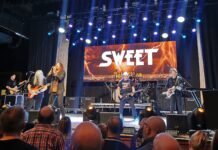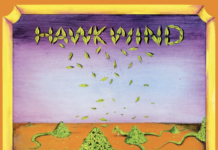Compelling, experimental, and highly original, the avantgarde metal ensemble known as Vulture Industries have captivated and challenged music addicts around the globe for 15 years now. Their elusive and charmingly eccentric frontman Bjørnar E. Nilsen invited RAMzine into the band’s dark and twisted world…
Musically speaking, Vulture Industries has never been a predictable entity. Was the will and determination to experiment and push the boundaries present from the very beginning of the band‘s career? Were you very conscious about that back then?
B.: No, not really, I do not think that we were sure what we wanted to do really. We wanted to make the kind of music that we wanted to listen to ourselves. Having said that, I think we were very conscious of the fact that we did not want to repeat ourselves, do the same thing over and over, and paint ourselves into a corner. Constant repetition was not the way to go, so I do think that the idea of keeping things fresh and different each time was there from the band’s inception.
Perhaps the desire to spawn music that you wanted to listen to yourselves was the motivation back then?
B.: Definitely, but of course, one is inspired by everything around them, be it music, people, or your surroundings or whatever, but the motivation to compose and write one’s own music and to keep doing that is rooted in the need to create something and to express oneself. As a side effect, one is also creating something that others will appreciate and value, which is kind of like a bonus, really. On the other hand, when you see that what you have created means something to others then that turns into a motivating factor also.
One could also argue that writing music that you appreciate and like yourself often results in others liking it as well in that there is a certain honesty to it. If you pour your heart and soul into it, then I would wager that there are people out there who will appreciate and dig your music or perhaps relate to its themes, motifs, and whatnot, regardless of whether we are talking about 12 people or 12000 people…
B.: Absolutely, and if you view music as a language, then usually you will find either a lot or just a few listeners who speak that same language, especially if the music is honest and convincing. It does not matter if there are many devoted listeners our there or not; the most important thing is that it is from the heart. Speaking for myself, it is quite motivating to see how some people are moved by our music.
Exactly, because when we listen to music there is nothing better than being moved or perhaps transported to somewhere else. We love being inspired by something else. That is a beautiful thing.
B.: Earlier on today, I started crying while listening to a particular song ha-ha.
As I said, there is nothing better than being moved ha-ha.
B.: You know, that kind of thing might also happen when I am working on ideas and stuff in the studio. Sometimes I get so carried away and absorbed by it all that suddenly I find myself just standing there crying ha-ha, usually when I have laid down a vocal track.
That is nothing to be ashamed of ha-ha. When you spoke about people being moved by your music, were you referring to when you guys perform live, when you receive emails from fans, or perhaps when you speak to them after the shows?
B.: Mostly in a live setting where we experience the music in a more intimate way with the audience, but of course, social media also comes into the picture here as fans and listeners often comment on the music and what the songs mean to them. But yeah, in a live setting you are experiencing the whole thing with the audience and in a way you create something new there and then simply because no two concerts, audiences, and venues are alike. The way in which I engage with the audience and express myself is perhaps a little more interactive compared to many others in that I move among the crowd, which results in the experience being different from time to time both for me as well as the band and audience. By walking among the crowd, you are able to see if or how people are moved by the music.
To play live must be like a symbiosis and the exchange of energy between the band and the audience must be amazing to experience. You are quite dramatic on stage. I would not say provoking as such, but one has to react to Vulture Industries in some kind of manner in the sense that one cannot attend one of your gigs and remain passive, at least in my opinion.
B.: That is true. I think it is difficult to remain passive during our shows, but I am of the opinion that art has to force people to react in some way. There is no point in listening to something that is insignificant or without meaning and substance.
The way I see it, Vulture Industries provoke strong reactions in the listeners.
B.: I agree that we are not provocative as such in that nothing we do is a provocation or upsetting, but some people are definitely being forced out of their comfort zones when I am in their faces and up close and personal during the show. People react very differently to it all. Some probably find it uncomfortable, but I am of the opinion that that is essentially good for people, if you know what I mean.
Yeah, true art provokes strong reactions in people be they positive or negative. As a music writer, there is nothing worse than reviewing an album or a book that is mediocre and bland. That is the worst, because it leaves you indifferent.
Totally, it is a waste of time.
As to the latest album, Stranger Times, was there anything different about the writing and recording process compared to earlier on?
B.: Yes, Edmond Karban (Dordeduh) was involved from early on in the process as a co-producer. That is something that we have never done before. On the previous album, we had Herbrand Larsen mix the album, which put a certain stamp on it, but the recording and everything else we handled ourselves. This time around, Edmond was involved in some of the creative decisions that were made during the tracking stage with respect to the arrangements and the shaping the songs. This added something unique to the album or at least something that helped make it unique. That outsider perspective was most beneficial. I could well imagine us doing something like that again. When it came to mixing the record, Edmond and I handled that together, which also differed to how we did things on previous albums. Not everything worked out according to plan, but I think the result is really good and I am most pleased with the production and how things sound. It sounds better than earlier albums, but having two people mix it had its challenges with different ways of doing and structuring things and so on and so forth. There were some practical challenges as well that resulted in the process taking a little while longer than planned and some things required more time than needed, but like I said, I am very pleased with how it turned out.
I think it sounds razor sharp while also sounding warm and organic, which I love. Maybe it is just me, but I think the album is more melancholic compared to your previous outputs.
B.: Yes, I agree with that to a certain extent. It probably has some more melancholy aspects to it in terms of both the lyrics and the atmospheres that permeate the album. It feels less and carnivalesque too, I think.
Yeah, probably a little less theatrical and dramatic, but perhaps more emotionally intense in a sense?
Yes.
I think the lyrics are more introspective this time around also, more evocative somehow, but then you have always had a tendency to paint pictures with your words and music. I think Stranger Times is the high point in your musical career so far. It has a poetic quality to it.
B.: Very nice to hear that, thank you.
A song such as ‘As the World Burns‘ has an almost 80’s early Goth rock feel to it.
B.: I totally agree. I did not purposefully plan it like that, but it is based around a rather old main/verse riff that I have had lying around since the days of The Dystopia Journals. I did not know what to do with it back then.
But you had not forgotten it?
No, so I dug it up again while working on the material for Stranger Times and realized that we were at a point where it would be suitable to use that riff in that it would fit right in with the rest of the material. I think it turned into one of the best songs on the album and it does differ slightly from the other tunes on it, but you can easily tell that it is a Vulture Industries tune. I am very fond of early Goth music and I have absolutely no problem being compared to some of that stuff.
I think it adds dynamics and variety to the album. It is a breath of fresh air in a sense.
B.: It almost sounds like ZZ Top too. We have a guitarist who looks like he would fit right into ZZ Top ha-ha.
I am not sure if that is a compliment ha-ha.
B.: Ha-ha, it is not a compliment but a fact!
Speaking of old Goth rock and so on, do you recall how you were introduced to that particular style and genre of music?
B.: A lot of that stuff was something that was recorded before I started digging into that type of music, so I only discovered it much later on. Type O Negative had some references to early Goth music and Swedish Tiamat were very much inspired by 80s Goth rock on albums such as Skeleton Skeletron.
And A Deeper Kind of Slumber?
B.: Exactly, I am very fond of that one. Those bands made me discover some of the earlier Goth stuff and realize how much cool music there was to be found within said genre. Then there is The Cure, of course, but I discovered them somewhat late.
I have a tendency to dig into the past in terms of discovering new music or even genres of music. There are loads of 60’s and 70’s bands that I have only started listening to in later years, which is great, really. They move me now, but maybe they would have done nothing for me fifteen or twenty years ago? That goes for a lot of classic literature as well. Why do we read books that are 200 years old? I would wager that it is because they revolve around many of the same thoughts and feelings that permeate our lives nowadays; a lot of the same existential questions that we struggle with today were raised back then.
B.: Right. Even though we live in a totally different world today, if you take someone like Dostoevsky and his books, they were very much about what it was like to be human and what that meant. Those reflections and thoughts are still highly relevant today, just to list one author as an example.
At times, it feels as if our emotional lives have advanced or changed very, very little.
B.: Technology and science are way ahead of us in the sense that we cannot keep up, which obviously results in inner conflicts. Going back to classic literature and music from the past, one can never cover it all and if you dig down and immerse yourself in music that is thirty-forty years old or literature that is 200 years old then time has a way of applying filters so that the best things survive and are not forgotten about. There is always someone out there who has been inspired by these things and who has not forgotten about them, which is brilliant. All the crappy stuff is usually burned, destroyed, or used as cigarette paper ha-ha.
That ties in with what we spoke about earlier on about true art inspiring and provoking strong reactions in people. All the mediocre stuff is long gone, but then you also have the stuff that was controversial and even trashed and hailed as crap back in the day and now people tend to view it as a masterpiece. There is a certain irony to that.
B.: Exactly. Time has a way of changing people’s perception and perspective. As you said, art turns you either on or off.
Is there a direct coupling between literature and the lyrics to Stranger Times? ‘A Gentle Touch of a Killer‘ and the likes give me a literary feel somehow.
B.: Not that I can think of, at least not any specific or concrete examples, but I am very fond of Neil Gaiman and Edgar Allan Poe and they have certainly inspired me greatly. There are no works in particular that inspired me in the sense that none of our songs is directly based on any specific book or story. The theme of Stranger Times is partly inspired by the extreme polarization that we see in the world today and the feeling that we are close to the end of days and total collapse. The rest is very much about who I am and the kind of aesthetics that appeal to me.
Some of the lines and phrases give me a Victorian feel or bring to mind The Picture of Dorian Gray and similar works, which is meant as a compliment.
B.: I think those things are very much a part of the setting and atmosphere of our music, but I do not think so much about that in the sense that nowadays it just feels like a natural part of the whole thing.
Are there any specific works by Neil Gaiman that you dig?
B.: The last one that I read was Good Omens and I found that quite captivating. That one is in the process of being turned into either a movie or a TV series, I cannot remember which. I am very much looking forward to that one. American Gods also appealed to me greatly. That one was also turned into a TV series.
Is the TV series any good?
B.: It does not adhere strictly to the book, so the book and TV series feel like to different experiences, but I am okay with that. I like it. The casting is really good too.
I will make a note of that. As to inspiration, that often comes when one least expects it.
B.: Absolutely. The other day I was waiting for a ferry and as I was sitting there on the dock an idea suddenly appeared and eventually it mutated into a song. That one is almost done now.
Do you compose things mentally first before you pick up an instrument?
B.: Most often, I start with a few riffs or melody lines. Then I will try them out on the guitar and eventually build on those. If it all works according to plan then those few ideas mutate into more ideas and so on and so forth.
How long do you wait until you present the material to the others?
B.: That varies a lot. Sometimes I wait until the song is almost finished and other times I hand them just a couple of minutes of music.
So you just follow your instinct and present it to them whenever it feels right?
B.: Yeah, exactly, because one would like to feel that one is presenting something to them with a bit of substance to it and something that is actually worth building on.
I seem to recall that you once told me that despite you having written a song, you never feel that the song is complete until you have performed it live.
B.: That is true. The songs have a tendency to change slightly and take a few twists and turns when being performed live. In the studio, you can manipulate with all kinds of stuff, but you have to make it work live with four or five instruments and so very often, the songs are altered a tiny bit when we perform them in a live setting. The end result of the creative process is the version of the song that is performed twenty or more shows after it was recorded in the studio. It is just something that happens on an unconscious level, I think.
One could also argue that it would be pointless to watch a band perform live if the tracks sounded exactly like their studio counterparts.
B.: Yeah, that would be meaningless.
I am a sucker for live albums and I love the spontaneity and intuitive vibe of some of them.
B.: It is similar to when you cover a song by another artist; you ought to add something new to it, otherwise what would be the point of covering it in the first place?
Was the process of writing Stranger Times intuitive and spontaneous at some point or was it a painstaking labour of going over each detail? In other words, how obsessive were you?
B.: I can be both laidback and highly disciplined when it comes to that, which is a strange mixture really. I want the music to be felt and experienced in the right way, which is to say that I want to make sure that it sounds right in order to achieve the desired effect, but that does not necessarily mean that everything has to be perfect or played correctly. Things do not have to be strict or by the book. A lot of impulsive and intuitive stuff happens when I record the vocals because I tend to lock myself away and go crazy ha-ha. That would make for some interesting reality TV ha-ha. Some of those things are very spur of the moment. At the same time, many things are properly worked out and I listen to them countless times to ensure that things sound good and evoke whatever it is that they are supposed to evoke. Many first or second takes end up on the finished product.
To me, the album strikes the perfect balance between being focused, disciplined on the one hand, loose, and reckless on the other. It never feels rigid.
B.: There was a certain laidback approach to things in the sense that we would simply try things out and see whether they worked or not without being too calculating or meticulous, if that makes sense.
You do not strike me as a person who is haunted by his own sense of perfection.
B.: You are right about that. I have no need to listen to my own records and pick them apart. They turned out the way they did for a reason and due to the context in which they were created. I want to complete things and finish them and so on, but I have no need to go back and change anything.
What are you currently up to?
B.: I am writing new material for the next Vulture Industries record. Things are shaping up nicely and I am very happy with the things we have so far. I hope that the creative flow will be there for a little while longer so that we can start recording the album early next year. We also have some festival appearances and so on lined up for later on this year as well as a trip to Japan.



















